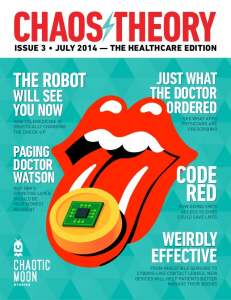Chaos Theory in Healthcare
Chaos theory, a branch of mathematics, has revolutionized our understanding of complex systems by identifying patterns in seemingly random and unpredictable behavior. The application of chaos theory in healthcare is gaining attention as it offers a novel perspective in managing the intricate dynamics within healthcare systems. This essay explores the utilization of chaos theory principles to enhance healthcare outcomes, promote patient safety, improve organizational efficiency, and stimulate innovation.
Understanding Chaos Theory:
To comprehend the application of chaos theory within healthcare, it is essential to grasp its fundamental principles. At its core, chaos theory examines the behavior of dynamical systems, emphasizing the sensitivity to initial conditions, the presence of inherent order within chaos, and the concept of self-organization. By acknowledging the complex interactions among various factors, chaos theory enables healthcare professionals to navigate the intricacies of the ever-evolving healthcare environment.
Improving Clinical Decision-making:
In healthcare, chaos theory has the potential to refine clinical decision-making by considering the non-linear relationships between patient characteristics, treatments, and outcomes. Chaos theory suggests that small changes in initial conditions can lead to significant variations in the final outcome. By incorporating this notion, healthcare professionals can adopt a personalized approach to treatment, accounting for the unique contexts and complexities surrounding individual patients.
Enhancing Patient Safety:
Chaos theory also contributes to promoting patient safety within healthcare systems. Understanding the interconnectedness of various components, chaos theory emphasizes the importance of error prevention rather than error correction. With this knowledge, healthcare organizations can implement proactive measures, such as standardized protocols, robust communication systems, and error reporting mechanisms, to detect and prevent potentially catastrophic events.
Optimizing Organizational Efficiency:
Healthcare systems are known for their complex nature, with various departments, professionals, and processes functioning independently while interacting concurrently. Chaos theory emphasizes the dynamic nature of these interactions, encouraging healthcare organizations to recognize the inherent complexity and adapt accordingly. Through the lens of chaos theory, healthcare administrators and managers can identify bottlenecks, streamline processes, and maximize efficiency, ultimately enhancing patient care delivery.
Stimulating Innovation:
Chaos theory encourages thinking outside the conventional boundaries, fostering an environment of innovative ideas and solutions. By embracing the inherent disorder and uncertainties within healthcare systems, chaos theory propels healthcare professionals, researchers, and entrepreneurs to explore novel approaches to medicine, technology, and patient engagement. This emphasis on innovation generates groundbreaking discoveries and interventions, revolutionizing the healthcare landscape.
Considerations and Challenges:
While chaos theory holds tremendous potential within healthcare, it also presents certain considerations and challenges. The multidimensional nature of healthcare systems requires a sophisticated understanding and implementation of chaos theory principles. Additionally, the application of chaos theory must also consider the ethical implications, patient privacy, and the need for rigorous evidence-based practices to ensure patient safety and improved outcomes.
Conclusion:
The application of chaos theory in healthcare has the potential to revolutionize the way we perceive and manage complex healthcare systems. By embracing the principles of chaos theory, healthcare professionals can enhance clinical decision-making processes, promote patient safety, optimize organizational efficiency, and foster innovative solutions. While challenges persist, the integration of chaos theory can pave the way for unprecedented advancements in healthcare delivery, ultimately benefitting both patients and healthcare systems as a whole.









